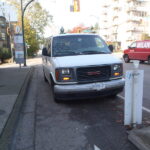Search Results
-
In the News: Urban Gardeners Get the Lead Out
Urban gardening’s great. The 0.03 Mile Diet is the ultimate in eating locally and seasonally. It can provide valuable perspective for how much water, fertile land, and labor go into growing our food—after taking up gardening, I can’t toss wilted veggies without serious guilt pangs. The popularity of pea patching is growing rapidly: the number of American households tending their own produce increased nearly 20 percent over the past year....Read more » -
Happy 15th Birthday, Sightline
Sightline’s greatest achievements over 15 years.Read more » -
Mini-Drivers
While we’re on the subject of overlooked academic studies, here’s another goodie (pdf link): an analysis of whether cars pay their own way. The basic question: do taxes paid by drivers equal public spending to support driving? The short answer: Nope! In fact, we’d have to raise gas taxes by somewhere between 20 to 70 cents per gallon for driving to pay for itself. I’d recommend reading the study itself...Read more » -
Wheels of Fortune
A decade ago, we wrote that the bicycle is one of the world’s seven everyday wonders because it’s so simple, effective, affordable, and pollution-free. To that list, we might have added “enriching.” Bicycling for transportation pumps money into local economies. Bikes are wheels of fortune. If your community spends money building bikeways, you and your neighbors will cycle more. Your cycling will put extra money in the local economy. (I’ll...Read more » -
Folds-mobile
Confession: I have long coveted a Bike Friday. What Cascadian cyclist wouldn’t? A made-in-Oregon folding bike that fits in a suitcase—and the suitcase becomes a bike trailer! Pedal to the airport or train station, take your luggage out of your trailer, fold your bike into the trailer, check your luggage (including your bike), and at trip’s end, reverse the process. Ingenious! So I danced a jig when a founder of...Read more » -
Gas Money
The US Northwest gets a raw deal when it comes to the economics of driving. We import from outside the region virtually every car we drive, not to mention nearly every gallon of fossil fuel we burn. So, the lion’s share of the money we spend on driving goes elsewhere. (Our newly updated energy counter illustrates this point with dramatic flair.) Interestingly, a new report from a Portland economist makes...Read more » -
Sticker Shocker
Everyone knows that cars are expensive, right? Still, it may come as a surprise to find out just how much money we spend getting from place to place. The cost of the car itself—typically the second biggest purchase many families make in their lives—is just the start. When you start adding in the cost of gasoline, and car insurance, and maintenance and repairs, and parking, and taxes to build new...Read more » -
More What "Bike Friendly" Looks Like
Separate bikeways are the lead actors in bike-friendly cities, but many supporting actors complete the cast: bikes on transit facilities, good traffic law enforcement, even bike “lifts” on steep hills. Three more worth mentioning are blue lanes, parking cages, and cyclibraries. 1. Blue lanes. My youngest son often bikes to drama rehearsals. It’s about three miles, mostly on traffic-calmed neighborhood streets and a bike trail—pretty good bikeways, overall. The only parts...Read more » -
Car-head
(This is the first post in a new series.) In the fall of 2000, in broad daylight, I pedaled straight into the tail of a stationary Jeep Cherokee. The SUV, parked in a cycling lane, complained noisily: its alarm wailed. I dusted off my bike shorts (and ego) and checked the damage. The truck was unscathed, of course. My knee was lightly bruised where it had hit the ground. My...Read more » -
The High Road?
Good news! The Rose City has irked the Federal Highway Administration. Why? Because it’s, um, centering its new transportation plan around people instead of roads. Metro is trying something different with the current plan update—giving the highest priority to projects that support the region’s goals for coping with growth, whether that means more roads, more transit or more bicycle lanes. The response from the FHA: The highway agency scolded...Read more »



